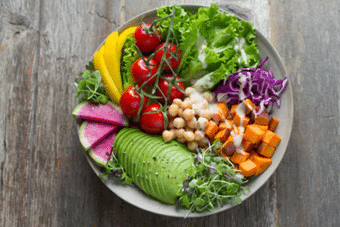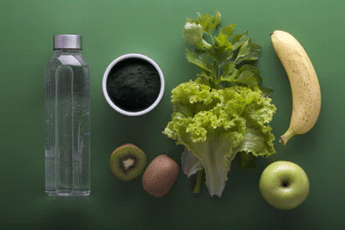How A Healthy Diet Can Help You Manage Stress Better

Who doesn’t feel stressed? Sometimes it’s an exam, or a job interview, a burnout from the job itself, or some personal issues that make us stressed. Do you know what happens to your body when you feel stressed? Your body goes in survival mode: you might find it harder to breathe, your heart may beat faster, your muscles may tighten, your hands may start trembling, and your blood pressure may rise. Everyone has a different response to stress, but mostly stress will hinder your ability to function, and you’ll feel triggered. A healthy diet reduces the negative effects of stress on your body. Here’s how you can manage your stress by eating healthy:

Cut Back On Caffeine
Caffeine helps you focus better, but if you take too much caffeine, it can make you feel more stressed and anxious than you actually are. Caffeine stays in your body for six hours, so it is advisable to take it only during the day and skip it in the afternoon. You can opt for decaffeinated coffee as well. If you have the will to skip coffee or black tea, you can add green tea to your diet. It has many antioxidants and helps in reducing your stress. However, you need to gradually wean off of caffeine before you switch.
Vitamins And Minerals
Vitamins B complexes, vitamin C, and Magnesium are important to incorporate into your diet for a stress-free life. Vitamin C controls the release of stress hormones that ultimately control all your emotional and physical responses to stress. Take oranges, peppers, broccoli, and tomatoes for your dose of vitamin C. Vitamin B complexes are important for regaining energy, especially after a stressful day. You can eat avocados, nuts, bananas, fish, meat, and dairy products to boost vitamin B in your diet. The best source of vitamins is fruits and green leafy vegetables. Magnesium is a mineral that relaxes the muscles and helps reduce anxiety. It is one of the most important minerals for coping with stress and is found in whole grains, vegetables, and nuts.
To manage your stress better, you need to ensure you are not deficient in any vitamins and minerals. If you have a busy routine with no time to make a wholesome, nutritious meal for yourself, scientists at designsforhealth recommend taking dietary supplements instead that are full of stress busters like vitamin C, vitamin B complexes, and magnesium to lower your stress levels. However, if you think of taking supplements, consult your doctor beforehand.
Whole Grains Are Mood Boosters
Carbohydrates increase the level of serotonin, which is a hormone that reduces stress and improves your mood. However, you need to add healthy whole grains to your diet rather than white bread, cookies, and cakes because refined carbs may actually increase the chances of stress and depression. Healthy carbs are unrefined carbs like sweet potato and whole grains, including brown rice, steel-cut oats, quinoa, and whole-grain bread.
Omega-3 Fatty Acids
Omega-3 fatty acids are essential acids that are known to improve your mood and reduce symptoms of stress. You can add flaxseed, walnuts, avocado, and fatty fish like tuna, salmon, sardines, and halibut to your diet to fulfill your dose of omega-3 fatty acids.
Dark Chocolate
You shouldn’t indulge in desserts while you’re stressed, but dark chocolate is an exception. Firstly, dark chocolate has antioxidants that help lower stress hormones. Secondly, just treating yourself with chocolate will make you instantly feel better. You can eat it daily but stick to a 1-oz serving.
Probiotics For Healthy Gut Microbiota
Your gut health is directly related to stress, mood, and anxiety. You should know that probiotics protect you from harmful bacteria, boost your immune system, and improve the absorption of nutrients. They also help by releasing hormones serotonin and gamma-aminobutyric acid, which uplifts your mood on any stressful day. You can take yogurt, kefir, kombucha, and miso to take probiotics to make your gut healthier.
You could also try adding seed sprouts to your meals. They are a type of germinated seeds that are often consumed as a crunchy and healthy addition to salads, sandwiches, and other dishes. Consuming sprouting seeds on a regular basis can have numerous health benefits. They are a powerful nutritional punch, and an excellent source of vitamins, minerals, antioxidants, and fiber.
High-Fiber Foods To Reduce Stress
A high-fiber diet is known to reduce stress and depression as it is gut-friendly and helps fight oxidative stress. You can add more fiber to your diet with beans, berries, green peas, almonds, sesame seeds, flaxseeds, kale, and broccoli. Fibers balance the blood sugar level, which is why they can prevent fatigue, anxiety, irritability, and fidgeting, which is usually caused by blood sugar imbalance. Make your diet fiber-rich to enable your body to manage the symptoms of stress better.

Your diet plays a major role in how your body fights stress. Healthy body, healthy mind, is a time-tested saying. Along with a well-balanced diet, you can try relaxing activities like yoga, gardening, knitting, or aromatherapy to de-stress. The best solution is to take care of yourself with a better, well-balanced diet, some physical activity, taking appropriate breaks, and staying happy!





